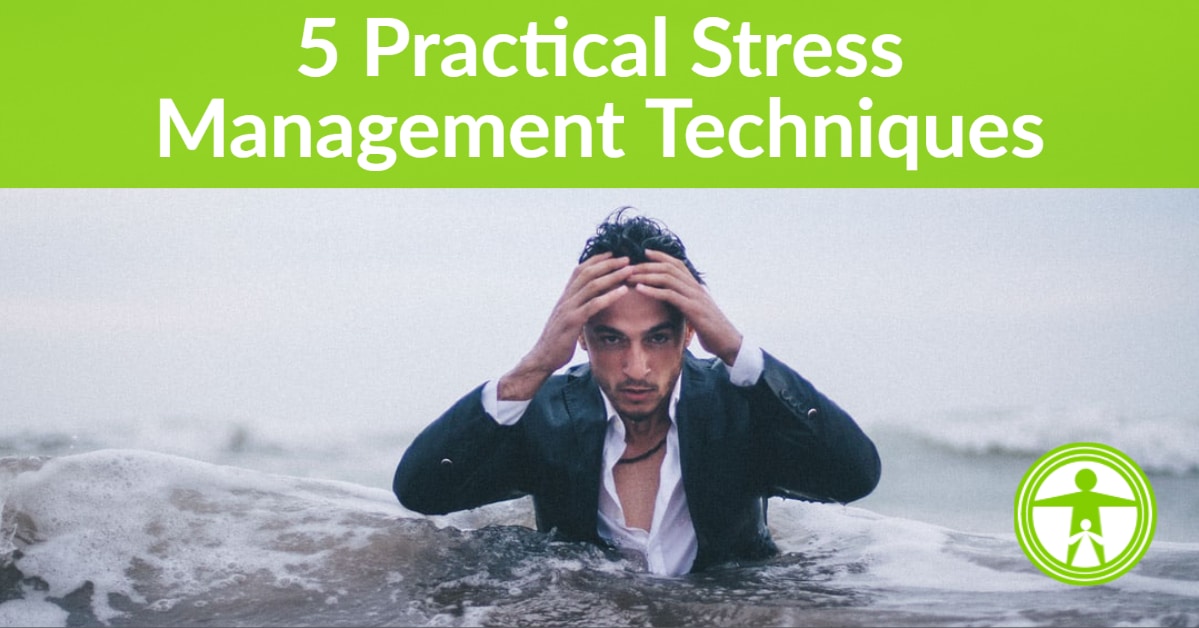Why Stress is Underestimated
Stress can take many forms. Some people experience it directly as anxiety, frustration or confusion.
Others only vaguely notice that the daily commute leaves them less energetic or hectic times at work make make them sleep less well.
And it’s not just the mind that suffers from chronically high stress.
Stress is bad for everything.
When you live a very stressful life, you die sooner. [1]
For your physique and fitness, chronic stress has been documented in research to have the following negative effects compared to low stress conditions.
- Reduced energy expenditure.
- Increased appetite.
- Comfort food cravings.
- Poorer carb tolerance and impaired nutrient partitioning.
- Up to twofold lower strength development.
- Up to twofold slower recovery post-exercise.
- Reduced muscle growth.
- A roughly twofold increase in injury risk.
As such, it’s not an exaggeration that poor stress management can make a twofold difference in the results from your diet and exercise programs.
So here are 5 tips to master your stress level and take control of your life.
1. Handle Stress with Active vs. Passive coping
In the psychological literature, coping strategies to deal with stress are classified as either passive (avoidant) or active (facing).
Many people spend their lives being passive and so too they deal with stress.
Passive coping means not dealing directly with situations or emotions.
Instead, people reach out to others (social diversion) or engage in different activities that ignore the stressor and provide short-term relief such as self-medicating through food, alcohol or instantly gratifying and distracting activities like watching television (task diversion).
Active coping generally results in better stress management.
Surprise: procrastination and ignoring the problem generally don’t make it go away.
Active coping means addressing or eliminating the situations or emotions themselves (problem- focused) or manage the resultant emotions (emotion-focused).
You’ll often hear psychologists emphasize emotion-focused coping: accepting responsibility, thinking of the bright side, seeking social support, that kind of thing.
That can all be useful, but it’s at its core still just a band-aid approach. Problem-focused coping generally works significantly better than emotion-focused coping.
Simply put, you need to address the root cause of your problem with actions, not thoughts.
- Got into a fight with your partner? Talk to him or her.
- Run into an obstacle at work? Fix it.
- Car problems? Call your mechanic or garage right now.
Dealing with the problem immediately and directly takes advantage of the stress. Acute stress is good.
It energizes you and motivates you to solve your stressful problems.
It’s only when the stress becomes chronic that you get problems.
Don’t let it fester.
2. ‘Work hard, play hard’ Does Help with Stress
Stress is unavoidable and indeed it needn’t be avoided altogether.
It simply needs to be managed.
An effective stress management technique is organizing your day into high and low stress phases.
Stress should have a circadian rhythm.
Most people do have phases in their lives, but these phases are called the workweek, where they are chronically stressed if not depressed and weekends/holidays, where the ‘relaxation’ looks an awful lot like hibernation.
Research on both animals and high-level athletes shows that they suffer much less from stress than the average person, because they are generally more calm (parasympathetic dominance) but they get more aroused (sympathetic dominance) in times of stress, like exercise. For a good read on the subject, check out Why Zebras Don't Get Ulcers.
So they experience strong but transient episodes of stress and thereafter let the body recover.
The stress is episodic, not chronic.
This is perfect in terms of General Adaptation Syndrome.
If you have a regular 9-to-5ish job, this generally means that the first part of your day should be the high stress part and your training should be during this part of the day.
When you get home, relax.
Turn off your mobile or at least turn off its internet connection.
When I was an intern at MD Anderson, I was literally the only one in my group who didn't carry a smartphone. I was also one of the few without symptoms of burnout.
Self-employed people have to be even more conscious of their lifestyle rhythm, because the office is generally also your home.
It helps to have a separate room in your house where you work.
Other than that, it’s highly individual (self-employed people tend to be eccentric), so you have to experiment.
And don’t just nod. Actually experiment with it.
Try working until you fatigue and then doing something else.
Try relaxing upon waking up and working at night.
It’s generally not a good idea to work all the way up until bedtime, as arousal can disrupt sleep quality and onset.
Note that you can also have several phases of productivity in a day.
You could, for example, have a productivity phase in the morning and in the evening with do-whatever- you-want phases in the afternoon and before going to bed.
3. Mindfulness Training for Stress Management
Mindfulness training is one of the few scientifically established tools that can actually help you cope with the negative feelings of stress.
The most popular form of mindfulness training is meditation, but there’s no need for any of the spiritual stuff.
Most of the studies on mindfulness training have very poor methodological quality, e.g. no control group, lack of blinding, no randomization, etc., but that still leaves dozens of convincing studies.
Meditation effectively resets your mood state.
A digital analogy is clearing out your brain’s cache.
Other benefits of meditation are much less documented, but the reduction in anxiety and depression have strong scientific backing.
Mindfulness meditation comes down to simply focusing intensely on something that does not evoke any emotional response, like a cube or a chair, for several minutes.
It sounds easy, but it’s really not and will take consistent practice.
For example, try going for a walk and focusing on every present moment. You'll find that your thoughts start thinking backwards and forwards and it's very hard to simply focus on what's in front of you.
It’s easier to do in a quiet, un-stimulating environment or with ear plugs, with your eyes closed, in a relaxed position (bonus points if you do it in lotus position).
If you don’t like ‘the hippie stuff’, it’s good to know that mindfulness training is no more effective than other relaxation therapies.
Being with friends, watching a relaxing TV series or getting a massage can all achieve the purpose of making you relaxed.
However, there is some evidence that mindfulness training can make you more mindful as a person in general and improve your ability to allocate attention.
Mindfulness training may increase our ability to observe and reflect without anxiety or judgement, improving our ability to make rational decisions.
While meditation is inherently a passive coping strategy, meditation can make active coping more successful.
It can help to meditate before you tackle a problem so you can deal with it in a rational manner.
There’s strong evidence that mindfulness training can improve our ability to deal with distress in both clinical and non-clinical settings, resulting in significant improvements in our mental and physical health, including mixed support for the treatment of eating disorders.
4. Expose Yourself to Nature for Stress
This is yet another piece of hippie sounding advice with good scientific backing.
Exposure to nature significantly reduces stress in various settings.
Here's a few other articles to meditate on or read on a nice patch of grass:
- https://www.ncbi.nlm.nih.gov/pmc/articles/PMC4419447/
- https://www.ncbi.nlm.nih.gov/pubmed/21431424
- https://pubs.acs.org/doi/abs/10.1021/es903183r
Exercise in nature is perceived as less effortful.
Even cancer is less common in greener areas.
Getting into nature is of course great, but it’s not always practical. Fortunately, even something as simple as having some indoor plants can significantly reduce your stress level.
So buy some plants.
See if you can take a more scenic route to your work or the gym, even if it’s a slight detour.
And try to go out into nature more often when life is stressful.
5. Be Flexible to Reduce Stress
Life often doesn’t pan out as planned and things don’t go the way you want them to.
And that’s how you experience stress.
Often though, this stress is needless neuroticism and you have options that are just as good as your original plan.
You just need to let go of your original plan.
For example, one of my patients had planned for their first bodybuilding show, but in a different state.
He booked the show, a flight and a hotel, had his whole contest prep planned out and asked for a holiday that week at work.
A few weeks later, however, his boss told him he couldn’t really go on holiday after all and they needed him in a different state for a short but important assignment.
Fighting his boss didn’t prove fruitful.
He even thought about suing and changing jobs. He had to do that show. Fortunately though, the solution was far simpler: change the show, not the work.
There was a similar bodybuilding show in the state he was required to be in for work that week. His work wasn’t a difficult assignment and wouldn’t interfere with his peak week.
He’d have to cancel the other show, hotel and flight and book new ones, but the overall cost was only about a hundred dollars, far less than the bonus he’d get from the extra assignment.
Don’t get fixated on the original plan.
Being flexible in how you cope with problems makes you more resistant to stress.
When things don’t go the way you want them to, rather than forcing through your plan at all cost or abandoning it altogether, reassess: what is my goal and what are my options?
There is always going to be options, you just have to meditate on it :)
Final Thoughts
Stress is not going anywhere. It's always going to be an issue.
What matters is how you learn do deal with your stress and whether or not you're improving your ability to deal with it.
Even Chiropractic Adjustments have been shown to reduce circulating levels of cortisol (stress hormone) in the body.
This is because the spine is the root of the nervous system and adjustments not only help to relieve tension in the muscles and joints, but calm the fight or flight reaction by activating the parasympathetic system.



